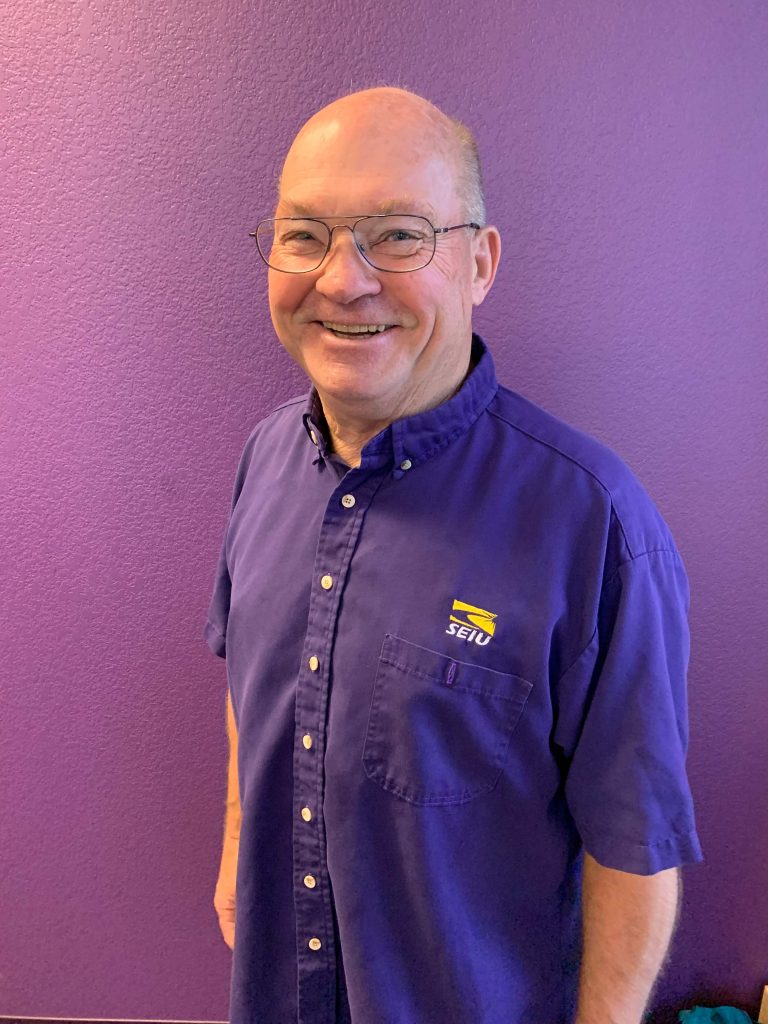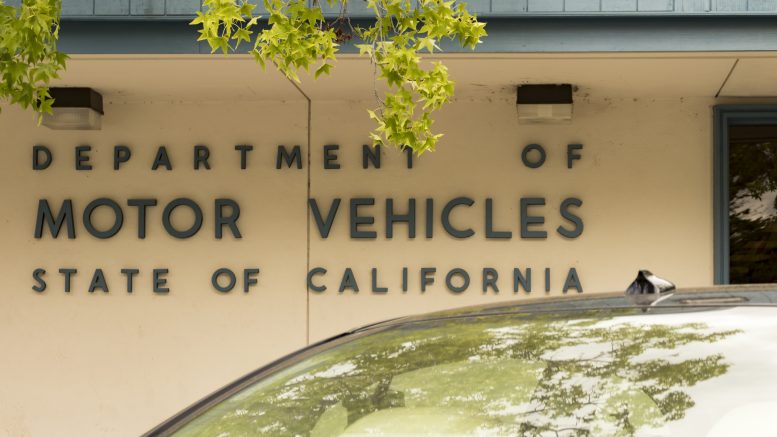Bill Hall is the new selected leader of the Sacramento local Service Employees International Union. ‘Local 1000’ is the largest public sector union in California and a united front of 96,000 working people employed by the state. Given the fact that the union’s transformation over the last year has been pretty dramatic, Hall discusses his vision, his plan and what might change at SEIU moving forward under his leadership.
There has been a lot going on at the SEIU in the last year—the end of Yvonne Walker’s term, a new president, and then the removal of that president. I would like to focus on another area: What now? The Board selected you as the new leader of the SEIU in which you now have to navigate through these difficult times. There are challenges for the union and political challenges with a new contract coming up. I wanted to explore your vision and the things that you’re working on in terms of any changes you might be making at SEIU 1000 and dealing with the contract.

We are taking steps to do our contract in a way that we’ve never done it at Local 1000 before. And that means a bunch of work in the political world ahead of time, a different way of interacting with our members that we haven’t done in the past. We’re reaching out and talking to them now. There will be a series of educational pieces in our internal communications with our members on starting, maybe as early as this week, to carry through all the way to the end of the year. How do unions work, how do we work, what’s the purpose of the union.
Can you talk a little bit about your personal background and why you chose to work with unions and particularly with the SEIU 1000?
I’ve always done better when I was represented by a union in my employment. When I came to work for the state in 1998, they were running a Fair Share election in Unit 1. I became a member and I voted for Fair Share Fees, and I became a full dues paying member.
I was asked to get involved after that when people tracked me down and asked me to do something. First it was to be a job steward. Then it was to become the bargaining unit representative for Unit 1 in the Oakland area. I did that through 2003. Then I was the DLC President on the Board. Next, I was back to being on the bargaining team from 2006 to 2009. Then I was Chief Steward. I was president and on the Board again since 2011. So I have many experiences in all different aspects of the SEIU 1000.
There are many different approaches in unionization. Some people do a trade union orientation and focus more on member benefits, whereas other people have seen the need to have unions take a more global view, focusing on members but also on social issues such as increasing minimum wage, decreasing income inequality, and building up coalitions that end up helping wage and benefit discussions. I’d like to get your thoughts on this.
It’s a complicated one. Local 1000 exists for the purpose of making our members’ daily lives better. Now we can have a whole discussion around whether or not we’ve done that successfully over the years. But because we’re a public sector union, and because we’re public sector employees and our wages come from taxpayers, that has created a different set of circumstances and it’s been rough on state employees in California for quite a while. The question becomes, how do you improve people’s day-to-day lives? There is a place for us to do social justice work, there is a concept, which hasn’t been proven yet I don’t think, that if you lift up the bottom high enough then that puts pressure on the wage base above it.
If Local 1000 hasn’t been successful in the eyes of our members in the past, and that’s the perception that really matters, then the question is, what do we need to do different than what we’ve done in the past to be successful in the future? So that means looking at the tools that are available and figuring out which ones to use to get a better contract, to do better by our members.
So one example of that could be there are three prison closures in the budget. From a social perspective, I don’t think that’s a bad thing. If we’re incarcerating less people for long periods of time, that’s probably a good thing. But with that said, where are these prisons? They’re in communities that don’t have a lot of other sources of income. … If they’re going to close a prison, is there a way that we can get involved politically to help communities not suffer? There are three prisons out in the desert that are very close to a lithium mine—could they be converted to battery manufacturing? Would that bring decent paying jobs to the area? Would that support the community? That’s just one idea.
How do we do this different and use tools that we’ve never used before and where do we get in there and fight elbow-to-elbow to do better?
How about in terms of building political coalitions? Where you’re helping improve different groups or they’re helping you, a Roseville kind of model, where the unions play an active role and got support from different organizations, like increasing minimum wage?
We were heavily involved with SEIU International and the Fight for $15 (minimum wage). We’re still engaged in that fight. Former president Richard Brown took us out politically and out of SEIU State Council. We have re-entered our agreement with SEIU State Council, so that’s our political arm here in California and we’re working with them in partnership—supporting the overall political efforts of SEIU, in general within California, and then also looking at how we can build political pressure for a better contract for the people that we represent.
A union has many different points of entry like the president, the stewards, or the shop leaders—and those aspects of the union are very important. Where do you see yourself in that aspect?
All unions offer opportunity. Local 1000 is unique in that as big as we are and as many people as we represent, the structure between bargaining and governing offers opportunities for upwards of 500 people to be directly engaged in the decisions and the direction of the organization. Underneath that are the stewards in the workplace who do organizing and representation work. They run the local meetings and they represent members on contract violations. The steward level is entry level to being involved. For Local 1000, you have to be a steward before you can move on and do other things. Unions enable you to be involved in the civil rights movement. It also enables you to be politically active in a way that you would not be without the union.
Then the other thing that we’re rebuilding is a member off program. So every Wednesday we’ll be having 59 members off to go out and build the unions by recruiting membership, running meetings, having conversations on the importance of unionization and educating what a union is all about. How do we do better in our press to improve our lives working for the state of California?
“Our DMV workforce is a perfect example. They’ve been meeting face-to-face every day all throughout the pandemic, helping their fellow Californians. They are some of the lowest paid workforce for the state, and yet they show up every day and make sure you have your driver’s license and your car is properly registered. That to me is an everyday hero. Society doesn’t just happen.”
Bill Hall, new leader of the Sacramento local Service Employees International Union, ‘Local 1000’
In the 2018 Janus ruling, the Supreme Court threw out 40 years of established law and decided that the application of public sector fees to non-members was a violation of free speech. Recognizing this would create tremendous financial burden to the unions because employees could receive the benefits without having to pay the union fees, to which the Conservative majority of the Supreme Court said, in essence, “and the problem with that is—what?” Can you talk a little bit about the Janus ruling and what the impacts were?
We were not surprised at all because the Supreme Court had signaled prior “bring us the right case and we’ll decide against unions.” Janus just happened to be the case that ended up there. The interesting side of that is that the gentleman in that decision, two weeks within the Janus decision, left Illinois state service and went to work for a think tank in Washington D.C. for a large amount of money. So much for not thinking that there’s a quid pro quo or something else going on.
I think what the Janus decision highlights, along with other events in our society right now, is personal choice. It should make people stop and pause and think about what kind of society is in their best interest. … I don’t know if enough people look at what’s in their best interest long-term. I think a lot of people who think they can ride on the coattails of someone else and be in a union for free either fool themselves or don’t realize what the importance of the union really is. By the time they figure out that they’ll need one, we might not be here for them. We might be gone. Because they didn’t support us when we needed their support.
You don’t get all the benefits (if you’re not a member). For state employees, we only represent you to the first level, no legal representation if you’re not a member, no death benefit, representation is minimal. You get the benefits of the contract but you don’t have contract enforcement unless you figure out how to do it yourself. When you have a workforce that predominately doesn’t get in trouble, that workforce can say they don’t need the union. … But if we’re not here, who’s going to get you a better contract, increase your wages, improve your working conditions—because there is no other entity. I’m not getting an appointment with the governor to tell him how great of a worker I am, that’s just not going to happen. So if there’s no union, the only thing you’re going to get is whatever they decide to give you.
While Local 1000 is not perfect, while there’s good reason to be angry with Local 1000, the anger should start with the state of California, not the union. It’s easy to be angry with the union—there’s no consequence. It’s easy not to pay your dues, there’s no consequence today. I would argue that there’s a long-term consequence. It makes us weaker, we can’t get as good of a contract, you’re not going to get a good pay raise. Health care and telework might not be as good as you would like them to be because you haven’t given us your support. And the state’s not going to give us anything that we don’t fight for at this point. There’s no desire to give state employees anything. If you want something better than nothing, that’s what we offer. That’s the work that we do. We can’t do it alone. We can’t be successful without membership.
Right now, we are doing a membership drive to build a contract campaign. Our contract will end on June 30, 2023. Now the question is: How do we get a better contract? That means taking steps to do our contract and interacting with our members differently. And that starts with reaching out and talking to them.
What would you want to say to state employees who are working very hard doing incredible, important work but feel that they are a punching bag?
They are. They have been and they will be. We’re always scapegoated. It’s easy—what’s the consequence? There is none.
We’re out there all the time—essential workers. I would hope you would value us and see the service we deliver to you.
Our DMV workforce is a perfect example. They’ve been meeting face-to-face every day all throughout the pandemic, helping their fellow Californians. They are some of the lowest paid workforce for the state, and yet they show up every day and make sure you have your driver’s license and your car is properly registered. That to me is an everyday hero. Society doesn’t just happen. It’s not a magical thing, it takes two big pieces. It takes someone doing the work to keep the structure running—government—and it takes each of us as citizens in our belief that society and we are better off if we follow the rules and the structure. That’s the essence of the structure that we live in in this country. We have certain agencies and entities that support the infrastructure that keep it moving and working, and we have our piece, we vote and supposedly we drive the speed limit, we don’t do other bad things, we don’t litter. We follow the rules of the society.
How is Local 1000’s relationship with the International SEIU?
We pay a hefty annual support to the International. We’re the International’s single biggest Local. We go way back with the International. They want to keep us around and they want to keep us healthy. I’ve built a great relationship since I’ve been around the last five months, since I’ve been around Heather Conroy, the VP of the public sector division with her support staff and other people within the public sector division. Right now they are giving Local 1000 unprecedented support in rebuilding our membership and our Local in staffing and expertise, availability, investing a significant amount of money in over six months in time and resources for us to work on rebuilding membership. And trying to offset some of the less than positive things the Local experienced since July of 2021.
Why do you do this?
I make sure in my job that the department I work for and the public officials that I support look, sound and deliver the best message possible to the state of California and the constituents that live within that. That is the value I bring to California in the work that I do. Why do I do this? Because 50 to 60 hour work weeks for 40 hours of state salary is kind of insane. I have the ability to give back right now in my life, and we don’t always have that. Part of it for me is to give back, part of it for me is to make sure that Local 1000 is strong and can represent state employees after I retire. If I can be part of keeping Local 1000 moving forward for the future, in some way, trying to fix a broken system within the state, I think that is pretty good work to do.






Be the first to comment on "What does Bill Hall think about his new role at SEIU Local 1000? Quite a bit."